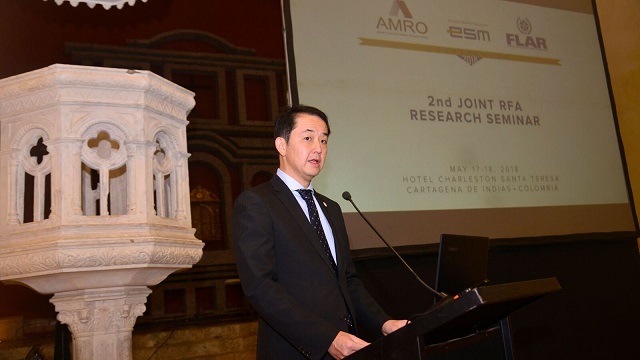
Mr Yasuto Watanabe, AMRO Deputy Director, delivers the opening remarks at the 2nd RFA Research Seminar.
Opening Remarks by Mr Yasuto Watanabe, Deputy Director of AMRO
at the 2nd Joint Regional Financing Arrangement (RFA) Research Seminar
Cartagena de Indias, Colombia
17-18 May 2018
(As prepared for delivery)
– Invitado distinguidos,
– Representantes de los acuerdos de financiación regional,
-Damas y caballeros,
¡Buenos días!
1. En primer lugar, me gustaría dar las gracias al señor José Darío Uribe, presidente ejecutivo, y a los colegas de FLAR por su hospitalidad y excelentes arreglos para el segundo seminario de investigación de los Acuerdos Financieros Regionales, un foro anual organizado conjuntamente por AMRO, ESM y FLAR. Cartagena es una ciudad llena de hermosos paisajes y rica cultura e historia, así como de actividades económicas muy dinámicas, especialmente en la industria marítima y el turismo.
[Distinguished speakers, Representatives from Regional Financing Arrangements, Ladies and gentlemen, Good morning!
1. First of all, I would like to thank Mr José Darío Uribe, Executive President, and colleagues from FLAR for your hospitality and excellent arrangements for the second RFA Research Seminar, an annual forum jointly organized by AMRO, ESM and FLAR. Cartagena is a city full of beautiful landscapes and rich culture and history as well as very dynamic in economic activities, especially in the maritime industry and tourism.]
2. Last year, AMRO had the great pleasure to host the inaugural Joint RFA Research Seminar in Singapore, which was well attended by participants from different parts of the world. We believe that this annual engagement shows the strong commitment of RFAs to collaborate and enhance the effectiveness of the Global Financial Safety Net or the GFSN. The seminar today provides an invaluable window to facilitate knowledge sharing among participated institutions, and allow us to learn from past experiences and to acquire lessons that may be useful for financial institutions, particularly RFAs, to better support countries.
3. RFAs are considered to be a key component of the GFSN whose other components are foreign reserves, bilateral swap lines (BSAs) between central banks, and the International Monetary Fund (IMF). In an increasingly integrated world, global and regional financial arrangements have been enhanced and should cooperate better with one another to form a comprehensive and effective safety net against financial crises and contagion.
4. At the global level, the IMF has been reviewing its facilities periodically to ensure that they are adequate to meet the financing needs of the members in light of developments in the global economy and financial markets. For RFAs, there have been continuous efforts by the RFAs to strengthen our own mechanism as well as the collaboration among RFAs and between RFAs and other layers of the GFSN. There is continuous challenge to further enhance our capacity and coordination in anticipation of any possible crisis in the future. The strong upswing of the global economy also provides an opportune time for RFAs to perform a more comprehensive review and reform.
5. In particular, there are several aspects that need to be enhanced in order to boost RFAs’ contribution in the GFSN:
• First, coordination among multiple layers of the GFSN. This is the prerequisites to provide timely and efficient support for countries that are in need of financing to support its external position. Countries should be able to combine the use of different tools in order to generate synergies in terms of timing of intervention, sequencing, size and conditionality design.
• Second, designing and applying a macroeconomic policy and measures to achieve a country’s macroeconomic and financial stability. Smooth design and implementation of policy and measures depend very much on the specificities of the beneficiary countries, and country ownership is crucial to ensure the relevancy and adoptability of the conditionality in the domestic policy and legal context.
• Third, regional economic integration and the role of RFAs. With the rising protectionist risks in major economies, especially from the U.S. administration, as well as changes in production networks, there is a need to strengthen intra-regional connectivity and integration to meet growing intra-regional demand and improve the resilience of the region against external shock. Earlier this month, AMRO released our flagship report, the ASEAN+3 Regional Economic Outlook (AREO) 2018, with the theme “Resilience and Growth in a Changing World”. The report suggests policy recommendations for the region to respond to those challenges, which might be relevant to other regions as well. I would highly encourage you to read the report to get more ideas on this topic.
6. In today’s highly interconnected global economy and financial markets, financial crises are bound to recur every now and then, although it is hard to predict when and where. Thus, strengthening RFAs and enhancing the coordination among different layers of the GFSN are crucial to securing global and regional financial stability.
7. We have an impressive list of speakers and panelists today who will bring prominent and diverse views and perspectives to the table. I believe that we will have a very informative and enriching discussion. [With this, now I would like to give the floor to Mr Rolf Strauch, ESM Chief Economist, to lead the first discussion session.]
Thank you very much.
